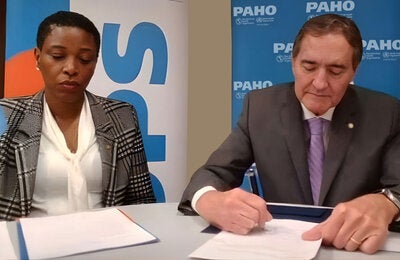Washington, D.C., 3 December 2013 (PAHO/WHO) — The Director of the Pan American Health Organization (PAHO) outlined a set of principles, goals and requirements for advancing universal health coverage (UHC) during the first of a series of seminars that PAHO will host on this subject.
In the seminar, titled "Universal Health Coverage and Social Security: towards Integration of Health Systems," PAHO Director Carissa F. Etienne said there is no one model of UHC that all countries should follow, but it is important to have a common understanding of what the concept entails as countries work toward its realization.
"Universal health coverage is not about a minimum package of care. It is not just about clinical services, and it is not just about health system financing," Etienne told seminar participants. "Universal health coverage ensures that all people have access to needed services—including prevention, promotion, curative, rehabilitative and palliative care—with sufficient quality to be effective, and without exposing individuals to financial hardship. Universal health coverage also provides renewed focus on the social determinants of health and the engagement of other sectors and civil society to promote health and well-being."
She said that achieving universal health coverage requires resilient health systems, effective social protection systems, social participation, and strong political will, as well as "governments that are committed to meeting the health needs of their peoples" and "that are prepared and competent to regulate the health sector" and other sectors involved in health and social welfare.
Dr. José Antonio González Anaya, President of Inter-American Conference on Social Security and General Director, Mexican Social Security Institute, described Mexico's successful efforts to expand health coverage beyond groups traditionally covered under employment-based programs. The Seguro Popular ("Popular Insurance") program has added 50 million formerly uninsured Mexicans to the list of those with social protection in health, he explained. However, Mexico still faces major challenges in ensuring quality health services and 100% coverage.
"What we have found in our research and our search for the best path is generally that we have to build on the institutions we have," said Gonzalez Anaya. "Countries that have done it that way have been more successful. We need to work together across different systems to provide coordinated and quality services. This takes time."
Dr. Maryse Robert, Director of the Department of Economic and Social Development at the Organization of American States (OAS), noted that social protection, including health coverage, has become "an essential element of poverty reduction." She said OAS member countries now recognize an obligation to develop and implement comprehensive polices and programs based on universality and equality and to promote "a new generation of programs and policies for social protection with multisectoral action as a central pillar."
Etienne told seminar participants that universal health coverage is a process that entails "the progressive realization of coverage for 100% of the health services needed by 100% of the people at zero cost." However, "you cannot achieve universal health coverage without attention to the social determinants of health, including access to water and sanitation, employment, education, cultural and religious values, and others," she emphasized.
"Universal health coverage is a powerful concept and a powerful movement that has begun not just in Latin America and the Caribbean but globally as well," said Etienne. "There is a growing consensus that universal health coverage should be a global goal that is part of the post-2015 development agenda."
Other participants in the seminar included Juan Lozano Tovar, Secretary General of the Inter-American Conference of Social Security; Ambassador Emilio Rabasa, Mexico's representative to the OAS; and Dr. Francisco Becerra Posada, PAHO Assistant Director.



